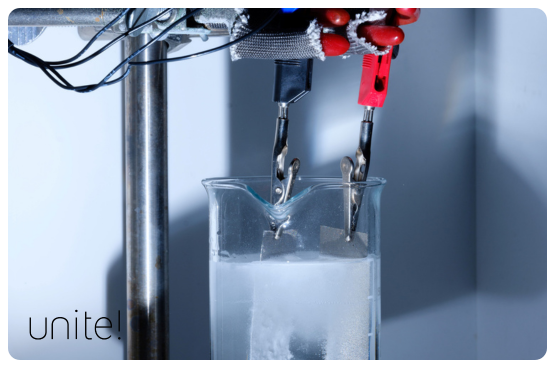
Unite!Energy Doctoral Network: 12 doctoral positions officially open!
The international Doctoral Network "Unite.Energy” is investigating the use of hydrogen for chemical energy storage. The network is being funded by the EU for four years with around 3.2 million euros. The call for applications for the 12 doctoral positions of the MSCA Unite!Energy, born within the Unite alliance, is officially open. The application deadline is the 6th of June 2024 (the call for DC6 and DC7 positions closes the 31th of May).
A fundamental problem of the energy transition is that the demand and the production of renewable energies do not sufficiently coincide - neither in terms of time nor location. Electricity can be generated in an environmentally friendly way, for example by converting wind, water or solar energy. However, the electrical energy generated in this way is usually not needed on site. In addition, the energy must be available where it is needed, reliably and independently of external factors.
It is therefore essential to store energy, transport it and then release it again elsewhere. Hydrogen is such a storage medium. With the help of electricity, water can be split into hydrogen and oxygen by electrolysis. If the electricity for electrolysis comes from renewable energies, this is known as "green" hydrogen. The hydrogen obtained in this way can now be stored and distributed. In the reverse process, for example in a fuel cell, the stored hydrogen is allowed to react with oxygen in order to convert the energy stored in the hydrogen back into electricity.
In this context, the MSCA-funded Unite.Energy project brings together European universities, corporations, and institutions in an effort to harness hydrogen as a chemical energy storage medium, produced through cutting-edge electrolysis and photoelectrolysis methods. This transformative endeavour seeks to reduce costs across the board, from production to storage and utilisation, while maximising environmental efficiency. Beyond technological advancements, Unite.Energy aspires to nurture a new generation of enterprising researchers, fostering integration of hydrogen in the energy sector through interdisciplinary excellence.
More information
- DC1 Unite!Energy - Doctoral student in Carbon nanomaterials with encapsulated metal nanoparticles as electrocatalysts for water splitting | EURAXESS (europa.eu)
- DC2 Unite!Energy - Doctoral student in catalyst layer optimisation for reducing noble metal contents in PEMECs | EURAXESS (europa.eu)
- DC3 Unite!Energy - Doctoral student in Proton ceramic cells (PCC) stacks for ultra-pure hydrogen production | EURAXESS (europa.eu)
- DC4 Unite!Energy - Doctoral student in Photoelectrocatalytic materials prepared by mechanochemical methods as photoelectrodes for hydrogen production | EURAXESS (europa.eu)
- DC5 Unite!Energy - Doctoral student in Optimisation of FeNC catalysts for fuel cell applications | EURAXESS (europa.eu)
- DC6 Unite!Energy - Doctoral student in Use of natural wood and biobased polymers as base materials for the elaboration of fuel cells components by additive manufacturing | EURAXESS (europa.eu)
- DC7 Unite!Energy - Doctoral student in development of novel catalysts for hydrogen fuelled alkaline membrane fuel cells | EURAXESS (europa.eu)
- DC8 Unite!Energy - Doctoral student in Design and optimisation of converter-fed electrolyser systems | EURAXESS (europa.eu)
- DC9 Unite!Energy - Doctoral student in Green H2-electrolyser based industrial systems for supporting future power systems | EURAXESS (europa.eu)
- DC10 Unite!Energy - Doctoral student in Physics-informed artificial intelligence for assessing and designing safe materials for hydrogen storage | EURAXESS (europa.eu)
- DC11 Unite!Energy - Doctoral student in Ensuring hydrogen safety operation through high performance computing and high-fidelity modelling | EURAXESS (europa.eu)
- DC12 Unite!Energy - Doctoral student in A sustainable path towards the innovative deployment of low-carbon H2 technology | EURAXESS (europa.eu)
For specific information about each position please write to: unite.energy@upc.edu.
Research in a tandem
The project is coordinated by the Universitat Politècnica de Catalunya. The partners TU Darmstadt, Politechnika Wrocławska, Politecnico di Torino and Universitat Politècnica de Catalunya, Aalto University, Institut Polytechnique de Grenoble, KTH Royal Institute of Technology and TU Graz , all involved within the Unite! alliance, work in tandems. Other partners from industry, the Friedrich-Alexander University Erlangen-Nuremberg and non-university research institutions are also participating in the project. At the end, the PhD students will receive a so-called cotutelle doctorate, i.e. a joint doctorate from two universities.
